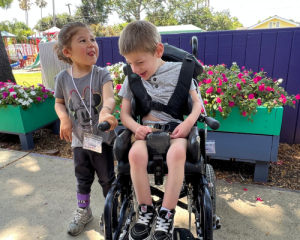
Candy Crush, Cookie Jam and other “match three” smartphone games seem so innocuous and fun. With simple rules—string three or more of the same objects together to work your way up through levels of play—and an aesthetic heavy on bright colors and jingly sound effects. But it’s also very easy to become obsessed with this type of gaming app.
Innocent Habit or Addiction?
The fifth edition of the Diagnostic and Statistical Manual of Mental Disorder states that it’s worth the research to determine if Internet Gaming Disorder warrants formal inclusion in the manual. That’s because findings so far indicate that Internet games trigger the brain the same way drugs do—when your child succeeds at a level, the reward center of the brain releases dopamine, a neurotransmitter that is associated with many things, including pleasure. Play the game enough, and the brain soon links that activity to pleasure, which makes you want more of it. That’s how it can work with these matching games, especially because the beginning levels are so easy that the rewards come fast and can get your son or daughter quickly hooked.
There are other reasons kids can’t keep hands off their phones or tablets when they are trying to clear a level in Frozen Free Fall. Pattern recognition appeals to the brain, and that’s basically what these games are—finding the links between similar objects. Your child also gets a sense of order when we match these objects and clear the game screen.
Satisfying the Cravings
It truly couldn’t be easier to play these games. Most of them are free to install on your smartphone and are simple enough to understand that your child can play them. Plus, they are visually and aurally appealing. Many of the games offer words of encouragement when players are doing well. Success is usually accompanied by explosions of color and sound.
Your son or daughter can also use social media to trumpet their progress to friends. And with hundreds of levels in each game—and new ones added all the time—your child could play indefinitely.
Crushing The Habit:
If Candy Crush, or a similar game, is taking up too much of your child’s time, here are a couple of simple tips to keep him or her in check:
- Set the alarm on the tablet or phone to only allow your child to play for a certain amount of time, such as 15 minutes; or
- Limit your child’s play to a time when he or she will be forced to shut down—for instance, before dinner.
You can, of course, delete the app from your phone, but make sure to replace the game with a good habit to help retrain positive brain activity. Spend the time you would have been on Bejeweled doing something else that keeps your child active such as reading, playing outside or taking a family walk.
Fred Richmond, Ph.D., is the executive director of behavioral health services at Mission Hospital Laguna Beach. The hospital is part of the St. Joseph Hoag Health network of care.











lori yonan says
I think setting a timer is a great idea. My husband has noticed lately that me and the kids are constantly playing WHILE watching tv and no longer interacting.